Bahá’í Community News
Regional Conferences of the Five Year Plan
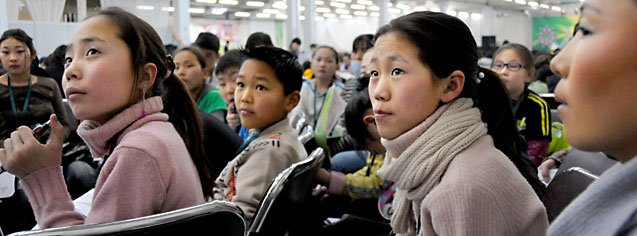 Young people played a prominent role at the conference. More photographs
Young people played a prominent role at the conference. More photographsThe Ulaanbaatar Regional Conference
24–25 January 2009
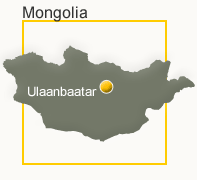
Ulaanbaatar was the gathering place for more than 1,800 Baha’is from Mongolia, Russia and other countries who braved fierce cold as they traveled to what is in fact the coldest capital city in the world.
Temperatures reached minus 30 C a day or two before the conference as people made their way to the gathering, including two groups who had to get special permission from the government to travel during a major snowstorm. More people than expected came from various regions of the country, including 408 individuals from Khovsgul, 143 from Khente, 160 from Uliastai, 120 from Sainshand, and 450 from the capital itself. More than 50 Baha’is arrived from Russia.
“The first reaction of many people on entering the conference hall was utter amazement and exhilaration at the number of participants,” said one member of the National Spiritual Assembly of the Baha’is of Mongolia. “Some even declared that a gathering of such a size was very rare in Mongolia.”
The conference was held in an exhibition hall – a vast empty space resembling a warehouse or a deserted aircraft hanger – that had been transformed through the efforts of a production team into an inviting, attractive, and serviceable conference center. There was a large stage, a huge screen on which the action could be seen, and rows of movable chairs that allowed for workshops, too. Simultaneous translation through wireless headphones was provided in three languages.
“I had no idea so many people would be attending the conference. The consultations have helped greatly to deepen my understanding of how we must act.”
Ms. Sasha Kononova, 28 - Ulan Ude, Russia
Representing the Universal House of Justice were Ms. Uransaikhan Baatar, herself Mongolian, and Mrs. Joan Lincoln, both members of the International Teaching Centre. Also in attendance were Continental Counselors Khursheda Porsayeva, Bijan Farid, and Delafruz Nassimova.
“The input that the counselors gave through their talks was an inspiration to all the participants as it helped them to find, in the words of the Universal House of Justice, ‘the courage to make whatever sacrifices are needed to ensure the resounding success of the Plan’ and to ‘recognize the profound implications of their mission,’” a member of the organizing team wrote later.
Various points in the talks were illuminated through stories. Mrs. Lincoln told of a rather shy nurse who was apprehensive about organizing a devotional gathering for others in her department, but she plucked up courage and did it. It was a great success, and later her superior asked her to organize more such gatherings as it had had such a calming effect on the staff.
In order to encourage the friends to rise up and help other communities establish intensive programs of growth, Ms. Khursheda Porsayeva used the example of a group of neighbors helping another neighbor to build a house, doing it without being asked and in a spirit of selfless service. The spirit alone furthers the development of a community, she said.
Presidential adviser attends
On both days of the conference, the participants were honored by visits from Mr. Tsedendambaa, adviser to the president of Mongolia for religious affairs.
“This was indeed an honor, and on both occasions Mr. Tsedendamba addressed the conference,” one of the members of the National Assembly recounted afterwards. “His second talk was particularly heartwarming and encouraging to all the Baha’is as he said that in 2008 the president had initiated a program of development to extend until 2020, and that this was complemented by the Baha’is’ goal of developing many intensive programs of growth. He said the Mongolian Baha’is should be an example to others and was confident that they could be, that the Baha’is should lead the way in developing a new standard of high moral conduct. He said he had read many of the (Baha’i) writings … and was very impressed by the Baha’i teachings. He ended his talk by saying that he encouraged all the Baha’is to propagate these teachings.”
“The journey here took one and a half days. There were 30 of us on the bus, and we were singing all the way. I have learnt many things so far and feel that I now know much better what to do when I return to Uliastai.”
Ms. Ninge, 16 - Uliastai, Mongolia
The conference was also addressed by Dr. Batsererdene, a former minister of health and the owner and director of the Etugen Medical College in Ulaanbaatar where for the past two years Baha’is have been conducting classes in moral education through a Ruhi Institute course. This year, with a team of 14 Baha’i facilitators, 400 students are following the course at the request of Dr. Batsererdene.
In her talk, presented during a session on Baha’i core activities, she spoke of her commitment to her students’ receiving moral education, saying that doctors and nurses must become good people and see themselves as servants of humanity. Her students, she said, have benefited from the first institute course and she would like to see them progress through all seven courses. A large group of the students attended the conference, as did other people from the wider community from other parts of Mongolia.
For the Baha’is, the conference was not only a time to celebrate past achievements and make plans for the future, but it was a wonderful opportunity to be together with so many fellow believers, including with Sean Hinton, who came to Mongolia in 1988 out of his desire to share the Bahá’í teachings and who returned to Ulaanbaatar to attend both days of the conference.
The task of organizing 1,700 people into 41 workshops on Saturday and 17 cluster groups on Sunday seemed daunting, yet on both occasions – through careful planning and training of the facilitators and the many youth serving as ushers – the groups were positioned and formed with remarkable ease. Both workshops were very successful, and a number of people, including some of the participants from the wider community, commented on the high quality of the consultation.
At the Sunday workshop a great number of commitments were made to help certain areas establish intensive programs of growth, and many individuals said they would strengthen their commitment to the core activities. Among the participants who came from Russia, seven people from Ulan Ude offered to move to Yakutsk to assist with the work there, and it was decided that the goal for Vladivostok should be the establishment of an intensive program of growth by July of this year.
Cultural programs
On both Saturday and Sunday evenings there was a rich and varied program of performances by Mongolian, Russian and other Baha’is.
Those who were professionals, state prize winners, and star TV personalities took their place alongside the local friends from the clusters, performing traditional as well as newly created Baha’i-inspired songs, dances and poems.
“Both (evenings) were an absolute delight and the range of skills and talents from people of all ages was remarkable,” commented a member of the National Assembly. “Both concerts were a confirmation of how powerfully the arts can lift the spirits and unite hearts together.”
He noted that two months ago, the Baha’is would not have believed it within the capacity of the community to host such a large conference.
“Yet it has been achieved with resounding success,” he said. “All of us have learnt what we can achieve if we have faith, courage and commitment, and work together in a spirit of love and unity,” he said.
Comments from visitors from the Etugin Medical College, Ulaanbaatar
 Mr. Erdenebat, 18: “I feel free to express my feelings here with people. I have learnt
how to help and understand others.”
Mr. Erdenebat, 18: “I feel free to express my feelings here with people. I have learnt
how to help and understand others.”
 Ms. Selenge, 20: “When I entered the hall I felt a confidence in myself….”
Ms. Selenge, 20: “When I entered the hall I felt a confidence in myself….”
Comments from participants
 Ms. Sasha Kononova, 28, Ulan Ude, Russia: “I had no idea so many people would be attending
the conference. The consultations have helped greatly to deepen my understanding
of how we must act.”
Ms. Sasha Kononova, 28, Ulan Ude, Russia: “I had no idea so many people would be attending
the conference. The consultations have helped greatly to deepen my understanding
of how we must act.”
 Mrs. Tserendulam, 67, Erdenet, Mongolia: “I am very happy to be participating in this
conference and feel that it is God’s will that I am here. I’m so happy to see so
many friends from my original community and to see how it has grown from small beginnings.”
Mrs. Tserendulam, 67, Erdenet, Mongolia: “I am very happy to be participating in this
conference and feel that it is God’s will that I am here. I’m so happy to see so
many friends from my original community and to see how it has grown from small beginnings.”
 Mr. T.J. Riggins, Japan: “The conference is fantastic. The speakers are all very
fluent, telling stories of their activities.”
Mr. T.J. Riggins, Japan: “The conference is fantastic. The speakers are all very
fluent, telling stories of their activities.”
 Mrs. Tumerbaatar, 68, Sainshand, Mongolia: “I’m very impressed by the conference.
It’s made me want to conduct the core activities with a new energy, as I understand
more fully that they must be a priority in our lives….”
Mrs. Tumerbaatar, 68, Sainshand, Mongolia: “I’m very impressed by the conference.
It’s made me want to conduct the core activities with a new energy, as I understand
more fully that they must be a priority in our lives….”
 Mr. Tumeroo, 27, Ulaanbaatar, Mongolia: “This is the first time the Baha’is in Mongolia
have organized an event on this scale…. The consultations have been conducted in
a very effective and respectful way.”
Mr. Tumeroo, 27, Ulaanbaatar, Mongolia: “This is the first time the Baha’is in Mongolia
have organized an event on this scale…. The consultations have been conducted in
a very effective and respectful way.”
 Ms. Ninge, 16, Uliastai, Mongolia: “The journey here took one and a half days. There
were 30 of us on the bus, and we were singing all the way. I have learnt many things
so far and feel that I now know much better what to do when I return to Uliastai.”
Ms. Ninge, 16, Uliastai, Mongolia: “The journey here took one and a half days. There
were 30 of us on the bus, and we were singing all the way. I have learnt many things
so far and feel that I now know much better what to do when I return to Uliastai.”
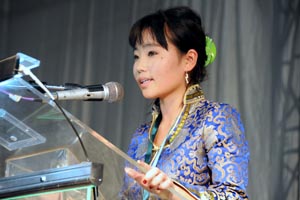
Most participants came from Mongolia, but more than 50 Baha’is arrived from Russia and several other nations also were represented.
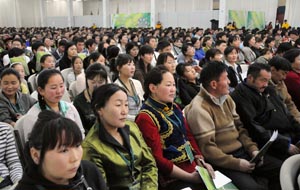
The gathering took place in a huge exhibition space that was transformed into a conference hall through the efforts of a special production team.

The first workshop sessions were for studying messages from the Universal House of Justice.
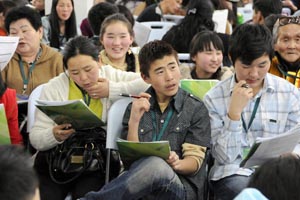
Most of the conferences have been characterized by the blending of different age groups at the various sessions.
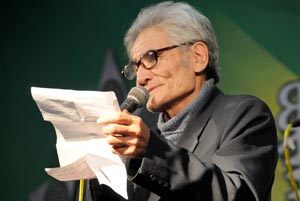
The gathering took place on the 13th of 18 consecutive weekends of conferences.

Both Saturday and Sunday evenings were devoted to cultural presentations.
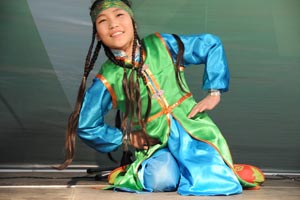
Colorful costumes added to the beauty of the program.
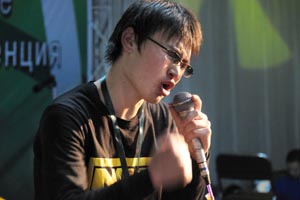
Youth were prominent in the performances.

Many stories were shared, highlighting different approaches to community development.
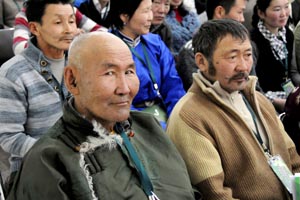
People were dressed for the cold. The temperature was minus 30 C in the days before the conference.
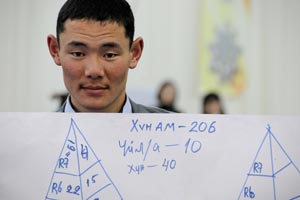
Workshops focused on specific plans for specific communities.
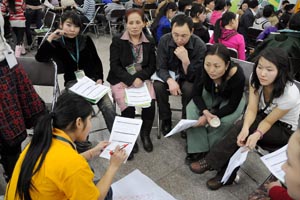
Participants consult about activities and are invited to make a plan for their own participation.

Feeding 1,700 people takes careful planning.
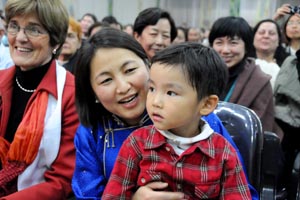
The representatives of the Universal House of Justice – Mrs. Joan Lincoln and Ms. Uransaikhan Baatar, herself a native of Mongolia – enjoy a relaxed moment during the weekend.













